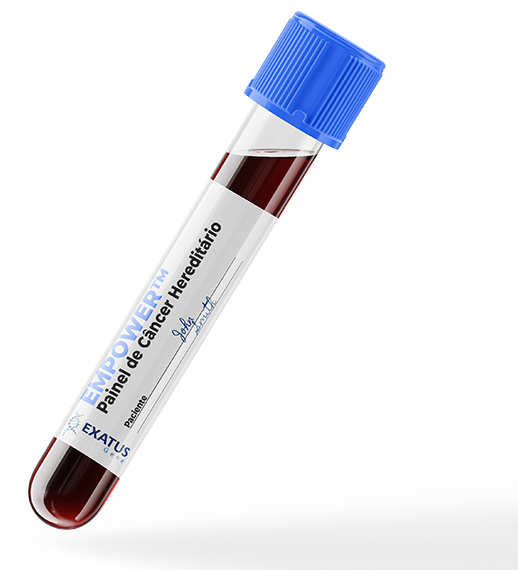
Empower is a genetic test designed for individuals seeking to better understand their risk of developing cancer due to frequent occurrences of cancer within their family or to guide personalized treatment options following a cancer diagnosis.
The panel includes genes associated with over 12 different types of cancer.
Empower analyzes specific genes to help determine your cancer development risk.
Between 5% and 10% of all cancers can be attributed to hereditary genetic variants or changes in a specific gene.¹ Cancer can run in families when individuals carry these variants. If you are concerned about cancer patterns in your family, genetic testing can provide more information about cancer risk.
Garber J. E., Offit K. Hereditary Cancer
Predisposition Syndromes.J. Clin. Oncol.
2005;23:276-292. doi:
10.1200/JCO.2005.10.042
69% of patients at risk for Lynch syndrome were never advised to undergo genetic testing.
Knowledge and update of genetic counseling and counseling and colonoscopic screening amoung individuals at increased risk for Lynch syndrome and their endoscopists from the Family health promotion Project.
2016 Feb;111(2):285-93.
Consider this test in the following cases:
EMPOWER™ é indicado para pacientes com suspeita de câncer hereditário:
Pessoas com múltiplos casos de câncer na família, especialmente se os diagnósticos ocorreram em parentes próximos (pais, irmãos, filhos) e em idades jovens. Famílias com casos de câncer hereditário, como câncer de mama e ovário, câncer colorretal hereditário, câncer de próstata, entre outros.
Indivíduos diagnosticados com câncer em idade jovem (geralmente abaixo dos 50 anos) podem ter uma predisposição genética que deve ser investigada.
Pessoas que desenvolveram mais de um tipo de câncer primário ao longo da vida, o que pode indicar uma predisposição genética.
Cânceres específicos que são frequentemente associados a síndromes genéticas hereditárias, como câncer de mama, ovário, próstata, pâncreas, colorretal, entre outros.
Indivíduos com histórico pessoal ou familiar de síndromes genéticas conhecidas que aumentam o risco de câncer, como Síndrome de Lynch, Síndrome de Li-Fraumeni, Síndrome de Cowden, entre outras.
Pacientes cujos médicos recomendam testes genéticos devido a fatores de risco identificados durante consultas e avaliações clínicas.
Pessoas que desejam informações detalhadas para planejar estratégias de prevenção personalizadas e tratamentos mais eficazes, especialmente se já foram diagnosticadas com câncer.
Pessoas sem histórico familiar ou pessoal significativo de câncer, mas que estão preocupadas com o risco genético devido a outros fatores, como ancestralidade específica ou exposições ambientais.
The panel includes:
AIP, ALK, APC, ATM, AXIN2, BAP1, BARD1, BMPR1A, BRCA1, BRCA2, BRIP1, CDC73, CDH1, CDK4, CDKN1B, CDKN1C, CDKN2A, CEBPA, CHEK2, CYLD, DDX41, DICER1, EGFR, EPCAM, EXT1, EXT2, FH, FLCN, GATA2, GREM1, HOXB13, KIT, LZTR1, MAX, MEN1, MET, MITF, MLH1, MSH2, MSH3, MSH6, MUTYH, NBN, NF1, NF2, NTHL1, PALB2, PDGFRA, PHOX2B, PMS2, POLD1, POLE, POT1, PRKAR1A, PTCH1, PTEN, RAD51C, RAD51D, RB1, RET, RHBDF2, RUNX1, SDHA, SDHAF2, SDHB, SDHC, SDHD, SMAD4, SMARCA4, SMARCB1, SMARCE1, STK11, SUFU, TERC, TERT, TMEM127, TP53, TSC1, TSC2, VHL, WT1
The methodology used for this test is as follows:
Blood: No fasting required.
Up to 21 calendar days
Medical request.

| Type | Description |
| Technique | NGS + CNVs |
| Depth | >100x |
| Coverage | >99% of target regions |
| VuS Resolution | Sanger, MLPA, *RNA-seq *RNA testing may help improve the detection and classification of certain variants that fall within splice site regions. If evidence suggests that a detected variant may impact splicing, RNA analysis will be performed*. An updated report will be automatically issued to you and your patient if a variant is reclassified with RNA analysis. |

Main Office Rua Bento Gonçalves, 59, Room 802 — Centro, Marau, RS — 99150-000
Porto Alegre Office Rua Gomes Jardim, 301 , Room 918/909 — Santana, Porto Alegre, RS — 90620-130